William Dalrymple Quotes
Most popular William Dalrymple Quotes
![At present it [the Koh-i-Noor diamond] is in fact only the ninetieth biggest diamond in the world. - William Dalrymple quote.](/img/q/68/53868A-at-present-it-the-koh-i-noor-diamond-is-fact-william-dalrymple.png)
At present it [the Koh-i-Noor diamond] is in fact only the ninetieth biggest diamond in the world.

Garcia da Orta is explicit that diamonds were not regarded as the pre-eminent gemstone by the Mughals.
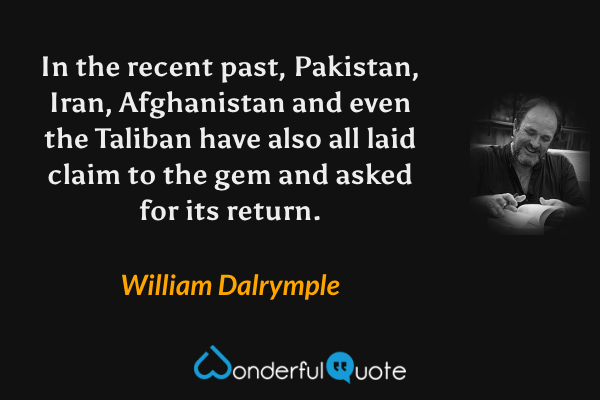
In the recent past, Pakistan, Iran, Afghanistan and even the Taliban have also all laid claim to the gem and asked for its return.

India has always had a strange way with her conquerors. In defeat, she beckons them in, then slowly seduces, assimilates and transforms them.

Of the great cities of the world, only Rome, Istanbul and Cairo can even begin to rival Delhi for the sheer volume and density of historic remains.

Ancient Indian diamonds were alluvial: they were not mined so much as sieved and extracted as natural crystals from the soft sands and gravels of ancient riverbeds.

India in the 1840s and 1850s was slowly filling with pious British Evangelicals who wanted not just to rule and administer India, but also to redeem and improve it.

Technically it is impossible to convert to Hinduism: as much a social system as a religion, to be a Hindu you must be born a Hindu; traditionally there was no ceremony for conversion.

At its purest, Jainism is almost an atheistic religion, and the much venerated images of the Tirthankaras in temples represent not so much a divine presence as a profound divine absence.

Until the discovery of diamond mines in Brazil in 1725, with the sole exception of a seam of black diamond crystals found in the mountains of Borneo, all the world's diamonds came from India.

So vast is India, and so uniquely resilient and deeply rooted are her intertwined social and religious institutions, that all foreign intruders are sooner or later either shaken off or absorbed.

David Hare, a Scottish watchmaker who founded the Hindu College in Calcutta, was actually denied a Christian burial when he died of cholera, on the grounds that he had become more Hindu than Christian.

In 1628, at the height of his power, Shah Jahan brought the Mughal love affair with precious stones to its climax when he commissioned the most spectacular jewelled object ever made: the Peacock Throne.

The Great Mughals, as one historian memorably observed, arrived in India from central Asia in the sixteenth century as 'ruddy men in boots'; they left it four centuries later 'pale persons in petticoats'.
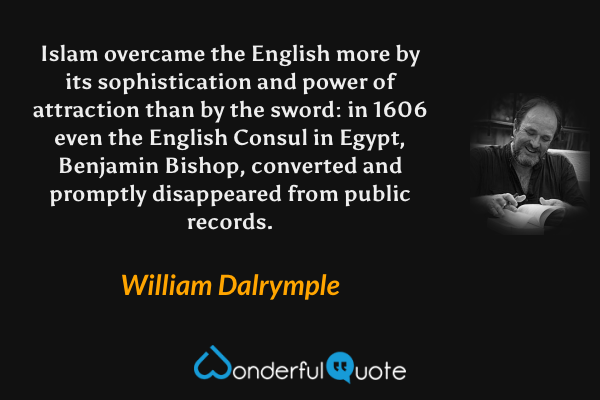
Islam overcame the English more by its sophistication and power of attraction than by the sword: in 1606 even the English Consul in Egypt, Benjamin Bishop, converted and promptly disappeared from public records.

Vans Agnew and Anderson were set upon and eventually hacked to death. This gave the British their casus belli and triggered an endgame that would ultimately lead to the total annexation of Punjab and the loss of the Koh-i-Noor.

Cornwallis arrived in India fresh from his defeat by George Washington at Yorktown. He was determined to make sure that a settled colonial class never emerged in India to undermine British rule as it had done, to his own humiliation, in America.

But what was built by the tact and conciliation of the first five of the Great Mughals was destroyed by the harsh and repressive rule of the sixth. Shah Jahan's son Aurangzeb was a ruler as bigoted as the best of his predecessors had been tolerant.

The fact that the word shampoo is derived from the Hindi word for massage, and that it entered the English language at this time, shows the novelty to the eighteenth-century British of the Indian idea of cleaning hair with materials other than soap.

It was not the British per se, so much as specific groups with a specific imperial agenda — namely the Evangelicals and Utilitarians — who ushered in the most obnoxious phase of colonialism, a change which adversely affected the White Mughals as much as it did the Great Mughals.
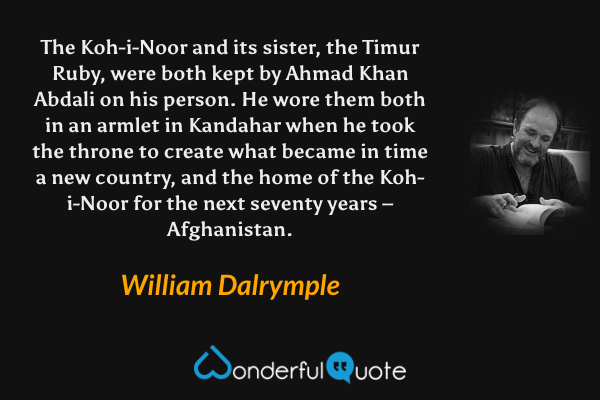
The Koh-i-Noor and its sister, the Timur Ruby, were both kept by Ahmad Khan Abdali on his person. He wore them both in an armlet in Kandahar when he took the throne to create what became in time a new country, and the home of the Koh-i-Noor for the next seventy years – Afghanistan.

Just as the blind can develop a heightened sense of hearing, smell and touch to compensate for their loss of vision, so it seems that the illiterate have a capacity to remember in a way that the literate simply do not. It was not lack of interest, but literacy itself, that was killing the oral epic.

All over India, as the eighteenth century gave way to the nineteenth, attitudes were changing among the British. Men who showed too great an enthusiasm for Hinduism, for Indian practices or even for their Indian wives and Anglo-Indian children, were finding that the climate was growing distinctly chilly.

The histories of Islamic fundamentalism and European imperialism have very often been closely, and dangerously, intertwined. In a curious but very concrete way, the fundamentalists of both faiths have needed each other to reinforce each other's prejudices and hatreds. The venom of one provides the lifeblood of the other.
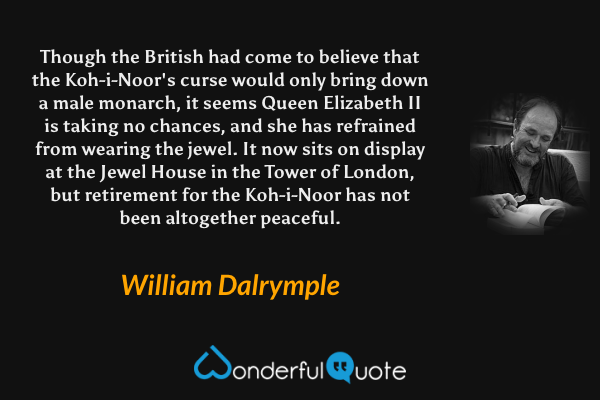
Though the British had come to believe that the Koh-i-Noor's curse would only bring down a male monarch, it seems Queen Elizabeth II is taking no chances, and she has refrained from wearing the jewel. It now sits on display at the Jewel House in the Tower of London, but retirement for the Koh-i-Noor has not been altogether peaceful.
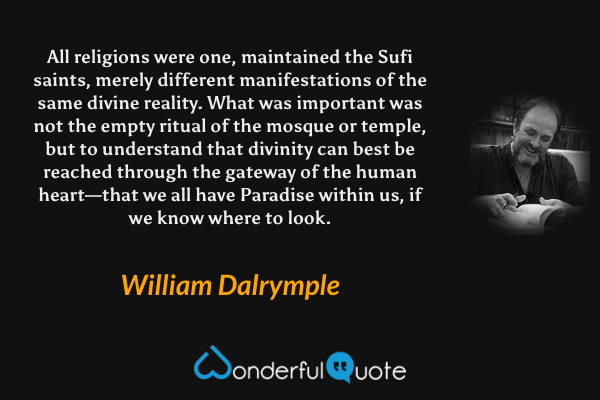
All religions were one, maintained the Sufi saints, merely different manifestations of the same divine reality. What was important was not the empty ritual of the mosque or temple, but to understand that divinity can best be reached through the gateway of the human heart—that we all have Paradise within us, if we know where to look.

The old British Residency, now the Osmania University College for Women, was a vast Palladian villa, in plan not unlike its exact contemporary, the White House in Washington. It was one of the most perfect buildings ever erected by the East India Company, and lay in a massive fortified garden just over the River Musi from the old city.

This new Imperial approach was one that Lord Wellesley was determined not only to make his own, but to embody. His Imperial policies would effectively bring into being the main superstructure of the Raj as it survived up to 1947; he also brought with him the arrogant and disdainful British racial attitudes that buttressed and sustained it.

One hundred and forty years later, it was out of Deobandi madrasas in Pakistan and Afghanistan that the Taliban emerged to create the most retrograde Islamic regime in modern history, a regime that in turn provided the crucible from which emerged al-Qaeda, and the most radical and powerful fundamentalist Islamic counter-attack the modern West has yet encountered.
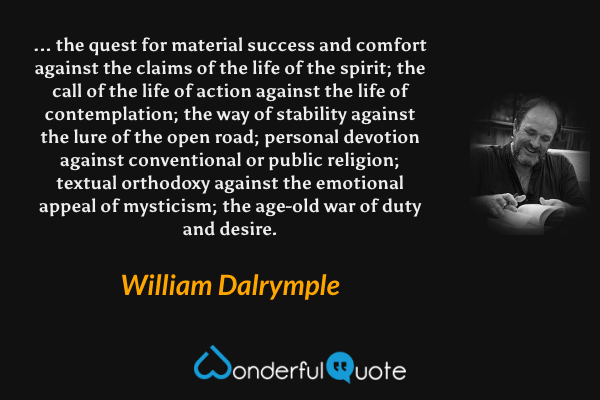
... the quest for material success and comfort against the claims of the life of the spirit; the call of the life of action against the life of contemplation; the way of stability against the lure of the open road; personal devotion against conventional or public religion; textual orthodoxy against the emotional appeal of mysticism; the age-old war of duty and desire.

For the first time there was a feeling that technologically, economically and politically, as well as culturally, the British had nothing to learn from India and much to teach; it did not take long for imperial arrogance to set in. This arrogance, when combined with the rise of Evangelical Christianity, slowly came to affect all aspects of relations between the British and the Indians.
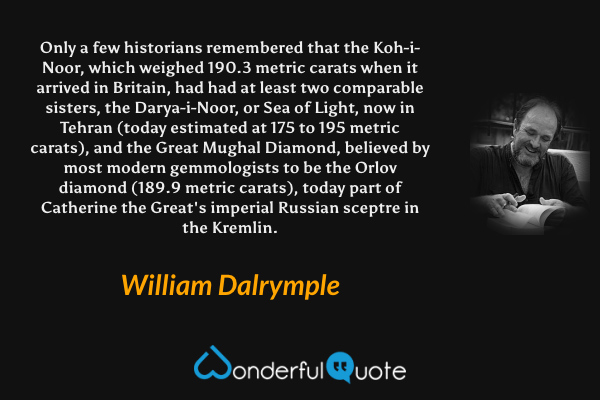
Only a few historians remembered that the Koh-i-Noor, which weighed 190.3 metric carats when it arrived in Britain, had had at least two comparable sisters, the Darya-i-Noor, or Sea of Light, now in Tehran (today estimated at 175 to 195 metric carats), and the Great Mughal Diamond, believed by most modern gemmologists to be the Orlov diamond (189.9 metric carats), today part of Catherine the Great's imperial Russian sceptre in the Kremlin.

Two things in particular seem to have put paid to this easy coexistence. One was the rise of British power: in a few years the British had defeated not only the French but also all their Indian rivals; in a manner not unlike the Americans after the fall of the Berlin Wall, the changed balance of power quickly led to an attitude of undisguised imperial arrogance. The other was the ascendancy of Evangelical Christianity, and the profound change in attitudes that this brought about.
![As the nineteenth century progressed, such rigidly orthodox views gathered strength in Delhi, and the position of the 'ulama solidified, so that by the 1850s the tolerant Sufi ways of Zafar and his court slowly came to look as old-fashioned and outdated as the hybrid lifestyles and open-minded religious attitudes of the White Mughals [the British who embraced Indian culture] did among the now solidly Evangelical British. The stage was being set for a clash of rival fundamentalisms. - William Dalrymple quote.](/img/q/53/53853A-as-the-nineteenth-century-progressed-such-rigidly-orthodox-views-gathered-william-dalrymple.png)
As the nineteenth century progressed, such rigidly orthodox views gathered strength in Delhi, and the position of the 'ulama solidified, so that by the 1850s the tolerant Sufi ways of Zafar and his court slowly came to look as old-fashioned and outdated as the hybrid lifestyles and open-minded religious attitudes of the White Mughals [the British who embraced Indian culture] did among the now solidly Evangelical British. The stage was being set for a clash of rival fundamentalisms.


